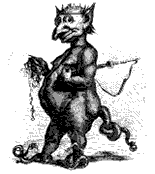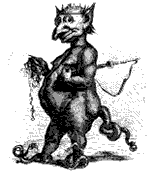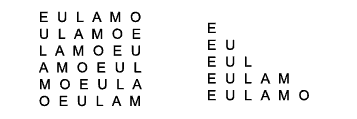After the imperial period, Voces Magicae – mysterious words that have no obvious or immediate meaning in Greek or any other language – became more prominent. These words are transliterated as small caps.
Ephesian letters
The most common set of voces magicae are the ‘Ephesian letters’ ( Ephesia grammata ) which probably had no special association to Ephesus. In their usual order, they are: askion, kataskion, lix, tetrax, damnameneus and aision (or aisia), though they can be rearranged into hexameter. These words resemble but are not Greek words, though Damnameneus was on of the Idaean Dactyls, the dwarf helpers of the magician-god Hephaestus. They were known to be in circulation since at least the 5th century BCE, though the first mention we have of them is a 1st century CE text found near Mycenae apparently giving thanks for vengeance.
The Ephesian vengeance (menysis) was sent down. Firstly Hecate harms the belongings of Megara in all things, and then Persephone reports to the gods. All these things are already so.
While commonly used in curses, the Ephesia grammata also seems to have had protective qualities, as a fragment of Menander reveals that they were used to ward off spells from newly marring couples. (F313 Korte)
Before 300 CE, these words were considered unintelligible to mortals, and therefore were powerful. However, around 300CE, Iamblichus argued that ‘foreign names’ (Barbara onomata) which may have meant what are now called Ephesia grammata or may have included those words, lost their meaning when they were translated into Greek and made intelligible.
ABRASAX
Most of the Voces Magicae were initially corruptions of the names of deities or demons in some language. The more they were used, the more power was attributed to them, and the more they were personalized into the names of demons. One demon, ABRASAX, was a cock-headed, armoured demon with snakes for legs – his Latinate title was ‘the Anguipede’. He was associated with the number 365 (based on the numerical value of his name’s letters) and hence with the sun.
Magical Alphabet: Characters
In the 2nd century CE, a magical alphabet started circulating called the ‘Characters’ (charakteres). They were often used in curses, some times being the only power invoked. A set of 38 of them was drawn on a pair of tablets from Apamea in Syria, and they were often drawn above the text in curses.
The letters of the alphabet were themselves magically effective, with the vowels, numbering 7, thought to hold power, and associated with planets, angels, and sounds. Often times, the Greek and Latin alphabet would be combined.
Magical Squares and Triangles
Additionally, voces magicae would often be arranged into shapes such as squares, triangles (isosceles or right angled), or diamonds (See below) and palindromes were also quite common.
Reference
- Ogden, Daniel. “Binding Spells: Curse Tablets and Voodoo Dolls in the Greek and Roman Worlds.” Witchcraft and Magic in Europe: Ancient Greece and Rome. University of Pennsylvania Press (November 1999) ISBN: 0812217055













 Greco-Roman Curses: Protection against Curses
Greco-Roman Curses: Protection against Curses